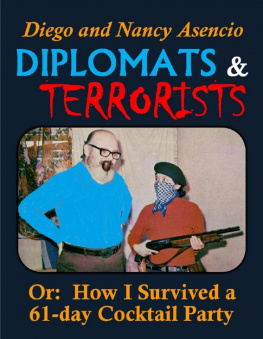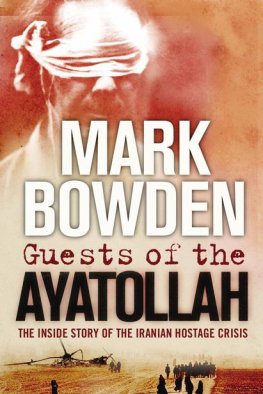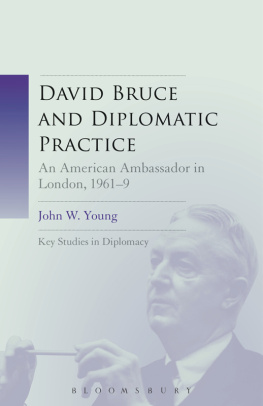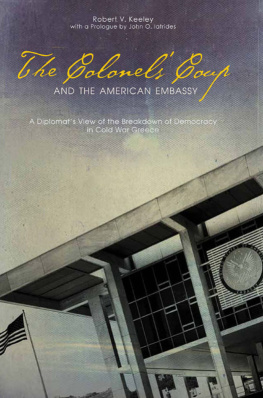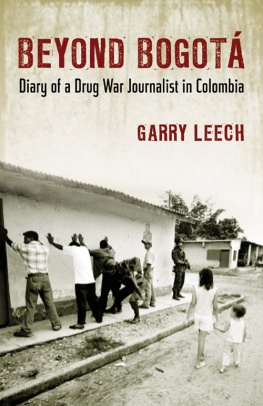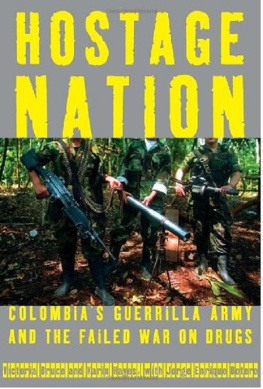Diplomats andTerrorists
Or: How I Survived a 61-dayCocktail Party
Diego and NancyAsencio
Published by MAP
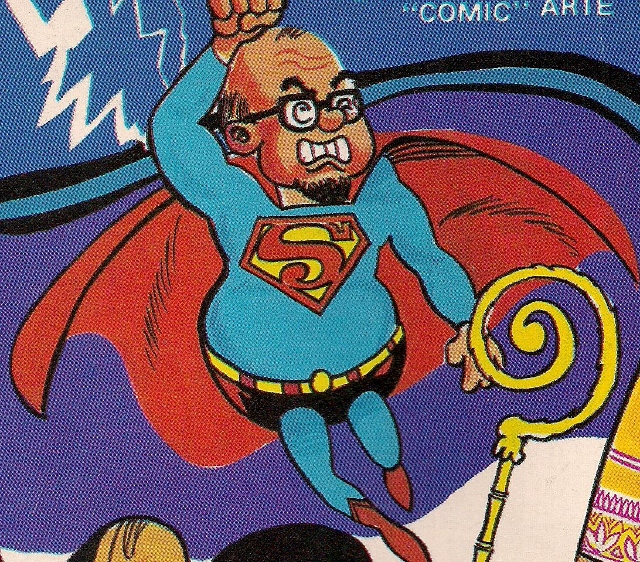
From a left-wing comic book, not intended asa flattering image, but Diego likes it.
Copyright 2011 by Diego and Nancy Asencio
Cover design by Amy Adams Livingston
Cover photo by Luis Guzmn.
All rights reserved. Editing, production ande-publishing
by Manuel Asencio Publishing atSmashwords
Photos of Diego Asencio copyright by theirrespective photographers
No Part of this publication may bereproduced, or stored in a retrieval system, or transmitted in anyform or by any means, electronic, mechanical, photocopying,recording, or otherwise, without written permission of the authorsand publisher, except for the inclusion of brief quotations in areview, article, book, blog, or academic paper.
PREFACE
In reviewing Our Man Is Inside today,we can truthfully say that we would not change one line of what wewrote in 1980. However, thirty-one years have passed and thepassage of time does lend a different perspective to theinterpretation of the past. Nancy was right in saying back thenthat we would probably stay married forever. Also, the mellownessand introspection which overtook me after my captivity slowlydissipated over time. Nancy was quick to reassure me that I was asbig a bastard as I ever was. As I got into the workaday world ofimmigration policy, I began once more to exhibit the driven natureof my personality.
One fascinating aspect of my return to civilsociety was that the public information sector of the Department ofState was anxious to put me before the Media. Most memorable was aluncheon meeting at The Council for Foreign Relations in New Yorkwhere I was introduced to journalist Tom Brokaw, who invited me toappear on the TODAY Show. We got to meet Jane Pauley and evenWillard Scott. This was followed in short order by an interviewwith Gail Sheehy of Passages fame. She was intent ondetermining why I had managed to survive my captivity in reasonablygood psychological shape. Her conclusion was that I had become soaccustomed to personifying the United States as a Foreign ServiceOfficer and as an Ambassador that I had developed acontinental-sized ego impervious to external assault. Nopost-traumatic stress disorder for me! On the other hand, callingmy ego continental-sized ruffled my feathers a bit, since I havealways considered myself humble and modest. I realize that in somequarters this assertion will be met with snickers, if not outrightbelly-laughs.
The saddest moment in the aftermath of myadventure was the untimely death of my friend Victor Sasson, theintrepid intermediary for the Jewish community in Colombia, who wasprobably as responsible as anybody for getting me out of captivitysafely. He was shot during an attempted kidnapping in Bogota. Ironyof all ironies, someone who had helped so many kidnap victimsbecame a victim himself.
One incident during my PR tour is vividlyetched in my mind. During a speech in Chicago, some smartass askedme how I would feel about my almost thirty year career beingovershadowed by what I did during those 61 days. Interestingthought, that! Had the hostage event been instrumental infurthering my career? Would I have been promoted to AssistantSecretary of State under normal circumstances? Would I have had theopportunity to shine in a high-profile position, eventuallyrewarded by being made Ambassador to Brazil, considered the toppost in Latin America? Being a great believer in serendipity, Ihold firm to the thought that my career has been a series of(relatively) happy accidents.
We managed to maintain the personal links wedeveloped in Colombia, some of whom are now deceased: IgnacioUmana, who had offered to pay my ransom; Enrique Santos, my friendand great publisher of El Tiempo and his son Juan ManuelSantos, now the President of Colombia. We have also been in touchwith David Manzur, the master Colombian artist, and of course, ourrelatives-in-law, including our grandsons grandmother, NormaFehrmann, also an artist of international stature. We treasure thecollage given to us by the late Alejandro Obregon, whose works canbe found at the OAS as well as the UN. Although we never met thegreat artist Botero, we did manage to acquire a signed lithographin, of all places, a consignment shop in Palm Beach Gardens,Florida. While we were in Mexico we learned that he had abandonedhis workshop without destroying his molds and were able to acquirethree small sculptures that his former workmen are stillproducing.
I have received various requests forinterviews with Commander One. These have been easy to turn down,regardless of money offers. There is no way that I am going tohonor this terrorist, who had threatened my life. Ironically, aColombian movie was made about the hostage incident, but of courseit tilted heavily towards the terrorists point of view, sincerebels and bandits are often admired and tolerated in Colombia. TheM-19 became a legitimate but third-rate political party, andCommander One became the Mayor of Yumbo, a middle-sized town nearMedellin. He was also a delegate to the most recent constituentassembly which produced Colombias current constitution. Colombianjournalist Yamid Amat told me that after consecutively interviewingPresident Turbay Ayala, Commander One and me, he was struck by thefact that we each felt we had been singularly instrumental inresolving the crisis. He has a point.
One of the unforeseen effects of thecelebrity status caused by my captivity is that I have become aspeaker in some demand for lectures on cruises, at conferences onterrorism, university assemblies and other organizations. Anadditional unexpected gig was being hired by Horacio Serpa as hisadvisor on US-Colombian relations during his presidential campaignin Colombia. I must not have done a very good job; he lost. Theheight of my contribution was an all-day discussion with hiscampaign staff that he should soften his strong nationalist image -which I felt was frightening the entrepreneurial class - by makinga pre-election visit to Washington and New York. I was voted downon the grounds that this would disturb his nationalist base. Ireally did not enjoy pointing out to him afterwards that if he hadlistened to me at the time, he might have won.
I have always felt that President ErnestoSamper received a bum rap when accused of accepting narcotics moneyfor his campaign. It kept him from realizing his potential as agreat president, since he was forced to divert much of his energytowards defending himself. I proposed that he permit me to set up afoundation in the US that would hire lobbyists, defend him againstthese assertions, and in the process defend Colombia. I wasassociated with the Florida law firm of Becker and Poliakoff at thetime. I discussed this with my friend Alvaro Gomez, the greatleader of the Conservative Party, who encouraged me with thethought that defending Ernesto was incidental to defendingColombia. Unfortunately, the Colombian Ambassador to the U.S. atthe time felt threatened by my proposal, making it impossible toraise funds or implement an appropriate policy. Curiously, he triedto set up a similar foundation of his own, which collapsed underits own weight.
There is an object lesson there that I alsoencountered during my early days as a civilian consultant. Americanbusinessmen would often see me solely as a door-opener. Afterintroducing them to worthwhile contacts, I was often dismissed witha Thank you, we will take it from here. A few weeks later, theywould be back with That didnt work. Before long, I beganexplaining to new potential clients that it was not just my titleor celebrity or contacts that were of value, but also my experienceand my knowledge of Latin American history, mores and customs.Needless to say, innate ability might occasionally play a part.
Next page
